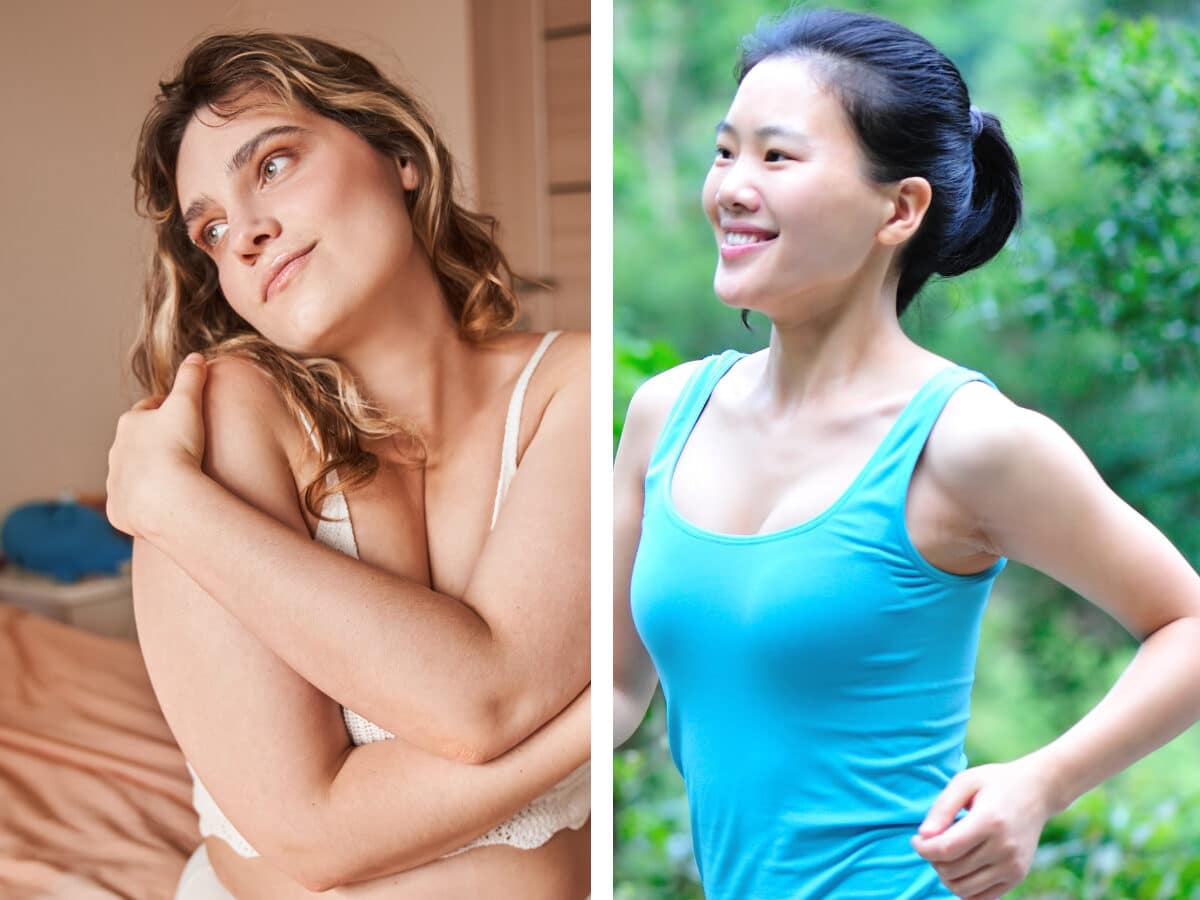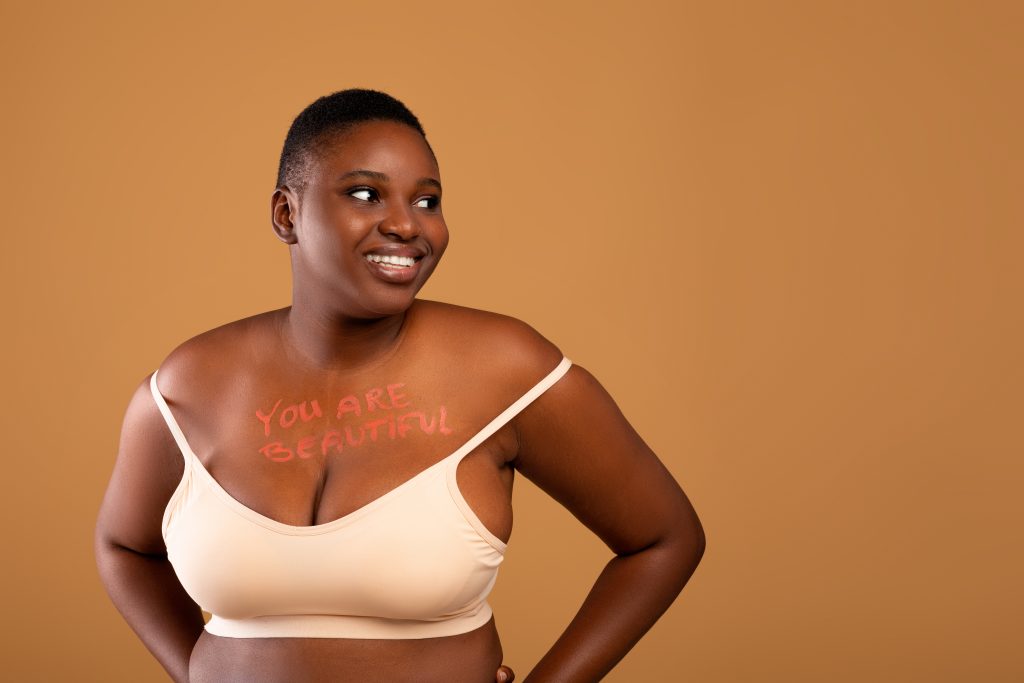While most of us have heard of body positivity by now, body neutrality is a relatively new idea that has sparked recent discussions on social media. Though a lot of people choose to align with one or the other, the potential for these different approaches to be integrated means that we’re all getting closer to having a better relationship with our bodies based on what works for us as individuals.
The Differences Between Body Positivity and Body Neutrality
With the growing recognition that not all aspects of the body positivity movement are so positive, it’s not surprising that more and more people are turning to body neutrality to combat their struggles with body image. While it’s a nice idea that everyone should feel beautiful no matter what they look like, in a society that constantly bombards us with beauty standards that are unattainable for the majority, this is often too much to ask. Even if you can manage to feel good about the body you’re in, body positivity still furthers the notion that how a person looks determines their value. This is what body neutrality works to invalidate.
The term body neutrality started appearing online around 2015 and gained even more popularity when Anne Poirier, a certified intuitive eating counselor, and eating disorder specialist, started sharing this approach with her clients. She sums up body neutrality as “prioritizing the body’s function and what it can do rather than its appearance.” We might not love the way our bodies look every day, or even ever, but this doesn’t have to be a factor in how we feel about ourselves. By focusing on the things our bodies allow us to do, as well as our non-physical qualities, we can begin to understand our true value as people.
The Limitations of Each Movement
Though body positivity began as a social and political movement that was fighting for equality for people in marginalized bodies, today most of us think of it as a form of self-love that centers around appearance. While it’s great that this concept has helped many people to recognize their unique physical beauty regardless of whether society validates it, we are beginning to see the pitfalls of body positivity as it is practiced today. We all know that the mainstream media upholds unrealistic standards of beauty but the body positivity movement also confines people, particularly body-positive influencers, to their “relatable” image. An example of this is when Lizzo received backlash for doing a juice cleanse from followers who perceived this as an unhealthy attempt to lose weight. On a more internal level, on the days when we just can’t conjure up love for our bodies, no matter how many affirmations we say, body positivity might cause us to feel shame and worse about ourselves.
While body neutrality takes the pressure off in terms of feeling like you have to love your body, it isn’t always easy to feel neutral about how you look in a world that valorizes physical beauty. In her video essay about body neutrality, YouTuber oliSunvia stresses that “we have been fed an idea for generations that in order to be valued as people we must look a certain way”. It will certainly take some time to undo this deeply ingrained belief and so it might not be possible for many of us to feel completely neutral about our appearance at present. In the video, Olivia goes on to discuss how, as a fashion lover, she doesn’t want to solely view her body as a “functional organism”, which is how body neutrality often frames it. Though she realizes that this ability to romanticize her body may come from a privileged position, she says:
“Even when I wasn’t poppin’ off in the physical attractiveness realm and I was unbelievably insecure, I liked clothes and I liked thinking about the way they would look on me as an artistic project.”
Olivia’s capacity to make aesthetic judgments about how clothes look on her without equating this to her worth shows that there is no universal recipe for having a good relationship with your body. What feels best differs greatly from person to person and can be influenced by a number of factors including someone’s personal interests, proximity to mainstream beauty standards, and level of self-confidence.
Can Body Positivity and Body Neutrality Be Practiced Simultaneously?
According to body image coach Jessi Kneeland, it is commonly thought that body positivity and body neutrality cannot coexist which probably stems from a misconception that the latter discourages self-confidence. In reality, body neutrality simply helps to “detach your self-worth from the perception of your appearance”, as expressed by YouTuber Salem Tovar. Ultimately, both movements aim to make us feel better about our physical selves by shifting the focus from outside perceptions of our bodies to the lived experiences we have within them.
When asked if it’s possible to love your body while practicing body neutrality, Kneeland says yes but only if we widen our understanding of love in this context. She explains that when a lot of people talk about loving the body they are really talking about “loving the status and privilege that specific bodies can acquire for you”. Even in the body positivity context, a person’s love for their body often corresponds to how good they feel about how they look. Kneeland reminds us that “you can still love a body even if you don’t like how it looks” and I believe that this deeper kind of love is accessible in both body positivity and body neutrality. When viewing our bodies positively feels unnatural or even impossible, we can still cultivate unconditional love for our bodies like we would for a loved one who’s having a tough day.
I think it’s also possible to access neutrality in both movements if we are willing to expand its definition. As humans, even if we decide that we want to feel body neutral, we cannot instantly, or maybe ever, eradicate all the loaded thoughts we have about our bodies given the beauty-oriented world we grew up in. Yet, whenever a thought or feeling about the body comes up, whether it’s positive or negative, we can still interpret it with neutrality, recognizing that it doesn’t necessarily mean anything about who we are.
Moving Beyond Labels
While labels such as body positivity and body neutrality are great for introducing us to new ways of relating to our bodies, given the complex nature of this relationship, at some point these can become limiting. Our moods, ways of thinking, and bodies are all ever-changing and so we might need to take a slightly different approach each day in order to feel better about ourselves. Every time you find yourself noticing your body you can experiment with whether it feels better to focus on body-positive affirmations, what your body can do for you, or something else entirely. With that being said, if one of these approaches feels right for you, then absolutely stick with it! The important thing is that we don’t let labels dictate how we should feel about our bodies when that feeling is no longer helpful or accessible.
I think instead of looking for everyone to fit into the same mold – everyone should be into either body positivity or body neutrality- maybe we should accept that everyone is different, and different mindsets work w different people
— ☁️?Jeanette Jayne (@cupidcitrus) July 1, 2022
Navigating Our Natural Love of Beauty
What about the days when you still want to feel physically attractive or you actually do feel attractive because of how you look? Whether you feel good, bad, or neutral about how your body looks now, your appearance and feelings are going to change over time and this is why knowing your true worth is crucial. In my opinion, viewing ourselves like we would a romantic partner could aid in this transition. You might find certain aspects of your partner physically attractive but if you truly love them, your love will not diminish as their appearance changes over time. You see their inherent value as a person and you can view yourself the same way! Enjoy your own physical beauty, if and when you can find it, but don’t become attached to it because it’s not who you are.
From a spiritual standpoint, it is said that the outer world reflects our inner one, which could offer some people another perspective on beauty. According to spiritual mentor Anya Grace, when you are feeling good emotionally your body will naturally transform into its most beautiful or balanced state, which looks different for everyone. Think about the times when you’ve witnessed someone doing their passion. Their eyes are bright and they radiate this attractive energy regardless of whether they fit into society’s beauty standards. On a practical level, I think this is what Grace is talking about because the people that we find truly attractive, on every level, are usually people who are living a life they are passionate about. This can give us hope that we don’t need to overfocus on our bodies or even our approach to our bodies in order to feel good in them. When we focus simply on enjoying life our bodies can naturally radiate beauty, the kind that goes beyond society’s limiting ideals.
We all have such different perceptions of ourselves and the world and so it’s important to be discerning about which popular mindsets you implement. It doesn’t matter what body type you have, you have the power to choose how to perceive and relate to your body. I would suggest focusing on whatever aspects of yourself or your life make you feel empowered and offering compassion to any parts of you that don’t!















